UK Fertility Report

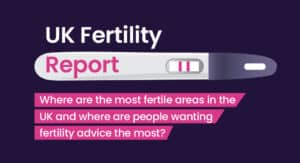
Finding out that you are expecting a child is often one of the happiest days of people’s lives. Many expectant mothers turn to a pharmacy online to purchase any medications or vitamins they may require during their pregnancy, ensuring that both mum and baby are as healthy as possible.
However, some people unfortunately struggle to conceive naturally and this can lead to a lot of confusion and upset. This leaves a lot of people looking for answers as to why they might be struggling to fall pregnant and seeking advice on how they can increase their chances of conceiving.
With this in mind, we wanted to find out which areas of the UK are the most fertile, and where people are looking for fertility advice the most. In addition to revealing these statistics, we will also compare fertility rates between countries to see where the UK stands internationally.
Luton is the most fertile area across England and Wales, with a fertility rate of 2.23
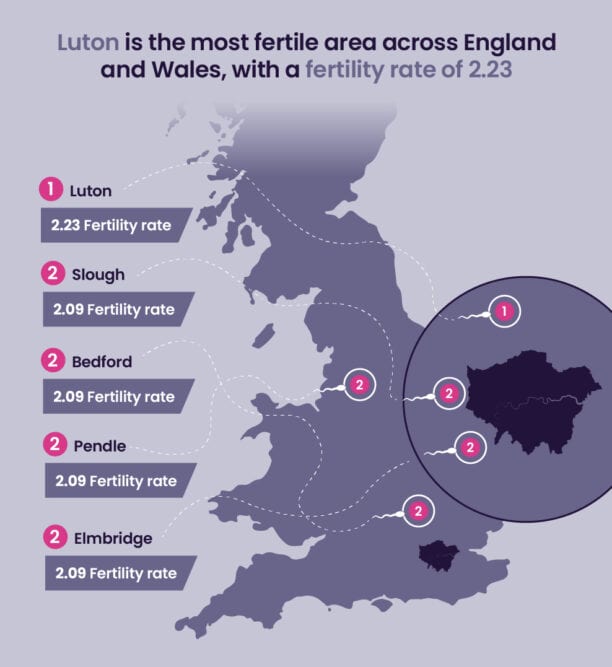
1. Luton – fertility rate of 2.23
Luton has been named the most fertile area across England and Wales, with a fertility rate (births per woman) of 2.23. This large Bedfordshire town is situated on the River Lea and has a population of approximately 222,907 people.
Throughout April 2023, the maternity unit at Luton and Dunstable University Hospital welcomed 424 babies, including 228 boys and 196 girls. Of these babies, 388 were born in the delivery suite, 30 were born in the Midwifery Led Birthing Unit, and 6 were born at home. The most popular day of the month for births was the 13th, with 21 babies born that day.
2. Slough, Bedford, Pendle, and Elmbridge – fertility rate of 2.09
There are four areas tying in second place, with a fertility rate of 2.09: Slough, Bedford, Pendle, and Elmbridge. Throughout 2021, there were 2,116 babies born in Slough, making it the area with the highest birth rate in Berkshire for that year. Frimley Health and Care, which covers eight areas including Slough, has its own maternity care planning app which allows users to choose their preferences and choices for birth, and share this information with their midwife.
209 babies were welcomed by Bedford Hospital in April 2023, including 110 boys and 99 girls. 100% of all new mothers received one-to-one care, with almost 80% of them beginning to breastfeed their newborns. The 11th and 13th were the most popular days for births throughout the month, with 12 babies being born on each day.
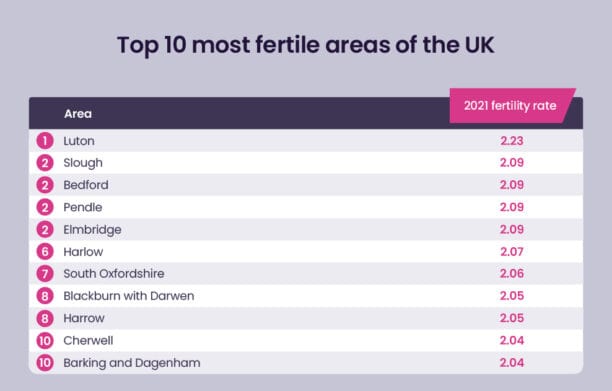
Cambridge has seen the biggest increase in its fertility rate over the last 20 years
1. Cambridge
- 2001 fertility rate – 1.20
- 2021 fertility rate – 1.90
- 20-year increase – 58.33%
The city with the biggest increase in its fertility rate over the last 20 years is the world-famous university city of Cambridge, in the East of England. Back in 2001, the city had a fertility rate of 1.20, making it the second least fertile area. By 2021, the fertility rate had risen to 1.90, showing an increase of 58.83%.
Rosie Hospital is the city’s maternity hospital and was opened back in 1983. Throughout the month of January 2023, 438 babies were welcomed by Rosie Hospital (219 of each gender), including six sets of twins. Of these babies, 370 were born in the hospital’s delivery unit, 60 were born in the birthing centre, 6 were born at home, and 2 were referred to another location. The 26th was the most popular day for births, with 24 babies being born that day.
2. Bedford
- 2001 fertility rate – 1.61
- 2021 fertility rate – 2.09
- 20-year increase – 29.81%
In second place is the town of Bedford, which had a fertility rate of 1.61 back in 2001. This figure had risen to 2.09 by 2021, showing an increase of 29.81%.
Back in May 2023, a new triage area was opened in the Cygnet Wing at Bedford Hospital. The previously tired space was transformed into a light and bright area, providing the ideal environment for expectant mothers and their families when they need monitoring and reassurance. A small ribbon-cutting ceremony was held by CEO, David Carter, and Trust Chair, Richard Sumray, with a number of maternity colleagues also in attendance.
3. Harrow
- 2001 fertility rate – 1.59
- 2021 fertility rate – 2.05
- 20-year increase – 28.93%
Following closely behind is the town of Harrow, which, back in 2001, had a fertility rate of 1.59. 20 years later, this figure stood at 2.05, showing an increase of 28.93%.
Over 4,000 mums and families are supported and cared for at Northwick Park Hospital every year, before, during and after giving birth. The hospital offers various antenatal services, including a ‘planning for parenthood’ class, and expectant mothers can sign up for these without a referral from their doctor. The hospital also has a partnership with Northwick Park Maternity Voices, which is chaired by local mums, and aims to help improve maternity services for both expectant and new mothers in Harrow, Brent and Ealing.
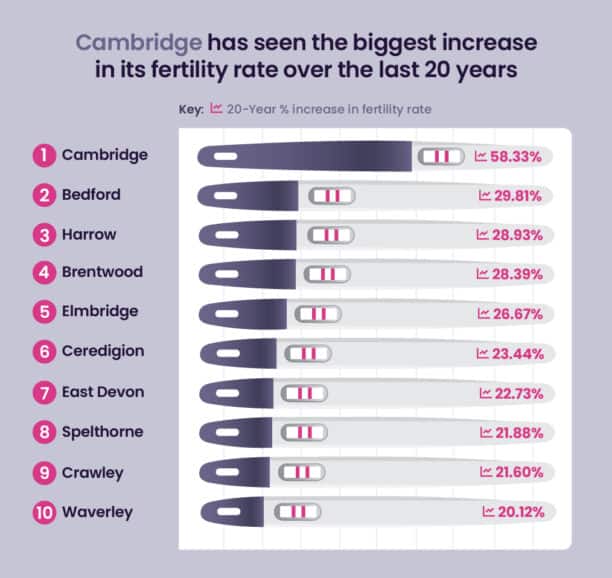
UK fertility rate at its highest in 1963, now decreased by almost 38%
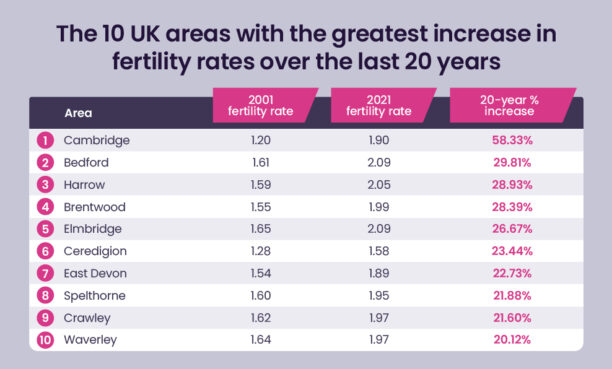
For those who are struggling to conceive naturally and are wanting to find out some more information surrounding fertility, it can be both interesting and useful to know how fertility rates have changed in the UK over the years. The UK’s fertility rate was at its highest during the 60s, remaining consistently high from 1960, when it stood at 2.62, right through to 1969, when it stood at 2.46. However, since records began in 1950, the highest fertility rate recorded in the UK was in 1963 when it stood at 2.81.
The 60s is known as a truly defining decade for the UK, with the years often being dubbed ‘the swinging 60s’. The teenage generation was the first one to be free of compulsory enlistment into the armed forces, meaning that they had the freedom to do what they wanted as young adults.
Perhaps one of the most significant events during the 60s was the legalisation of the contraceptive pill in 1967. Contraception was made readily available to women through the NHS after the 1967 Family Planning Act was brought into place. Before this, contraception was only given to women whose health was thought to be put at risk by pregnancy. The Abortion Act was also passed in the same year, allowing women to have an abortion if there were significant health risks to either themselves or their unborn child. These two Acts meant that women were able to take control of their own fertility for the first time.
Since the legalisation of the contraceptive pill and the passing of the Abortion Act, the UK’s fertility rate has continued to decrease (despite the odd increase every now and again), with its lowest rate being in 2003, when it stood at 1.66. The latest records show that the UK’s fertility rate currently stands at 1.75, showing a decrease of almost 38% since it was at its highest, and has remained at this figure since 2018.
How does the UK’s fertility rate compare to other countries?
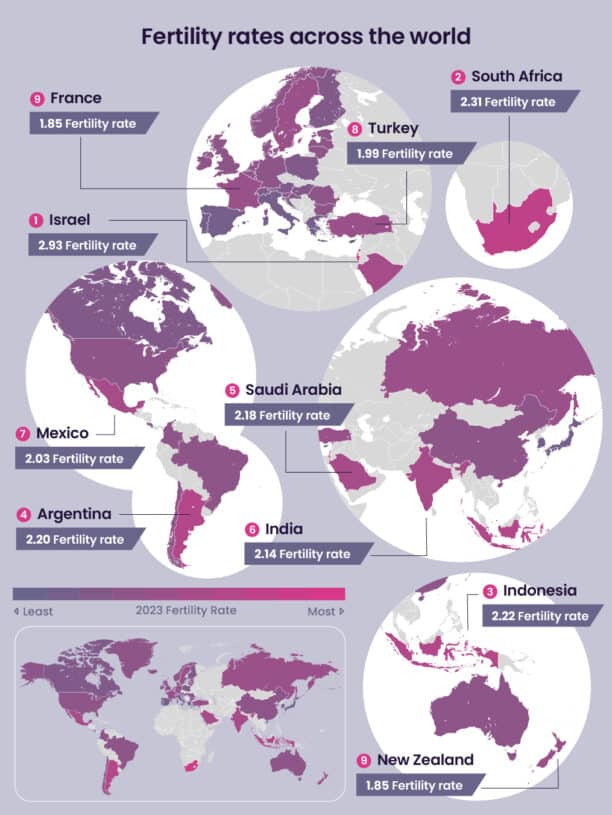
When it comes to fertility, it can again be both interesting and useful to know how the UK’s fertility rate compares to other countries, particularly for those who have relocated either to or from the UK. As previously mentioned, the fertility rate in the UK currently stands at 1.75, which is almost 38% lower than when it was at its highest in 1963.
Israel’s Current Fertility Rate of 2.93 is Almost 67.5% Higher Than the UK’s
Of the 49 countries that we analysed, Israel had the highest fertility rate, standing at 2.93, which is almost 67.5% higher than that of the UK. It is thought that one of the factors contributing to Israel’s high fertility rate is the policies that make it easier for women to have a good balance between work and general life after giving birth, such as reduced working hours after returning from maternity leave, and leave for sick children. In Israel, if a woman has been employed by a company for over 12 months, then they are entitled to 26 weeks of maternity leave (15 weeks of paid leave and 11 weeks of unpaid leave). A woman who has been employed by a company for less than 12 months is entitled to 15 weeks of maternity leave.
South Korea’s current fertility rate is over 38% lower than the UK’s, standing at 1.08
The country with the lowest fertility rate, of the 49 that we analysed, was South Korea, standing at 1.08. This means that South Korea’s fertility rate is over 38% lower than that of the UK. It is thought that the country’s low fertility rate could be due to the heavy link between marriage and childbirth. In 2020, just 2.5% of children were born outside of marriage in South Korea, compared to the over 40% OECD average. The South Korean government have attempted to increase the country’s fertility rate by offering longer maternity leave, bigger bonuses for having children and subsidising housing in Seoul for newlyweds.
Leeds is the UK city searching the most for fertility advice

1. Leeds
- Number of fertility-related Google searches per 100,000 people – 768.79
- Total number of fertility-related Google searches – 3,870
The UK city searching the most for fertility advice is Leeds, with 768.79 searches per 100,000 people and 3,870 searches overall from May 2022 to April 2023. This includes 120 searches for the phrase “how to increase fertility”, 1,630 searches for the term “how to get pregnant”, and 2,120 searches for the phrase “fertility clinic near me”.
There are thought to be around 9,500 babies born in the city of Leeds every year. Throughout the month of March 2023, 662 babies were welcomed into the world by Leeds Teaching Hospital, including 353 boys and 309 girls, with the heaviest baby weighing 11lb 1oz. 44% of these babies were induced and there were seven multiple births (e.g. twins and triplets). The most popular day of the month for births was the 28th, with, coincidentally, 28 babies being born that day.
2. Glasgow
- Number of fertility-related Google searches per 100,000 people – 563.69
- Total number of fertility-related Google searches – 3,450
In second place is the city of Glasgow, with 563.69 searches per 100,000 people and 3,450 searches overall within the specified time period. This includes 120 searches for the term “how to increase fertility”, 1,460 searches for the phrase “how to get pregnant”, and 1,870 searches for the term “fertility clinic near me”.
There are thought to be around 6,000 babies born in the city of Glasgow each year. Throughout the month of February 2023, 243 babies were welcomed into the world by Royal Alexandra Hospital, including 130 boys and 113 girls. The heaviest baby was born weighing 10lbs 5oz, and the lightest baby was born weighing 3lbs 5oz. The most popular day for births was the 4th and there were five sets of twins born.
3. Nottingham
- Number of fertility-related Google searches per 100,000 people – 551.59
- Total number of fertility-related Google searches – 1,720
Following closely behind is the city of Nottingham, with 551.59 searches per 100,000 people and 1,720 searches overall within the specified time period. This includes 100 searches for the phrase “how to increase fertility”, 710 searches for the term “how to get pregnant”, and 910 searches for the phrase “fertility clinic near me”.
There are thought to be around 8,000 babies born in the city of Nottingham every year. Back in October 2022, 658 babies were welcomed into the world at Nottingham University Hospital, including 339 boys and 317 girls, with the heaviest baby being born weighing 11 lbs. There were eight sets of twins born and 25 babies were born on Halloween. The most popular days for births were the 14th, 19th and 24th, with 27 babies being born on those days.
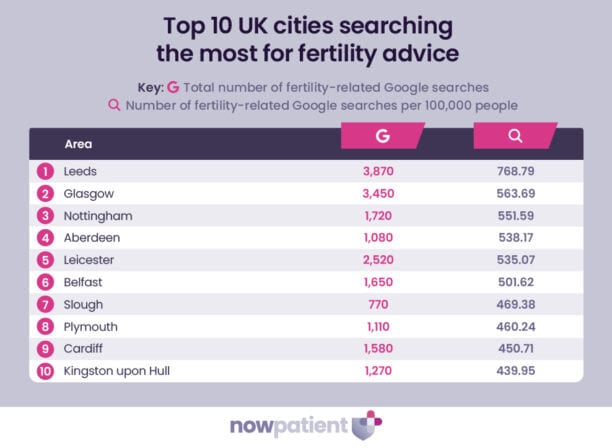
Methodology
We began by using Office for National Statistics in order to collect data detailing the fertility rates for over 330 areas across England and Wales. We then used this data to discover both the latest fertility rates and the 20-year increase (between 2001 and 2021) for each area.
We then used Macrotrends to gather the historic fertility rates for the UK as a whole.
Next, we used various sources to develop a list of G-20, OECD and EU countries. We then used Macrotrends again in order to gather the latest fertility rates for all 49 countries in our list, so that we were able to compare them to the UK. No data was available for the Czech Republic or Slovak Republic.
We then used The Geographist to gather the top 50 largest cities and towns within the UK by population. Finally, we used Google Keyword Planner to gather search data for the following fertility-related phrases: “how to increase fertility”, “how to get pregnant”, and “fertility clinic near me”. The data was gathered for the time period between May 2022 and April 2023. We used this data to gather both the total number of fertility-related searches for each area and the number of searches per 100,000 people.
All data was collected on 7th June 2023.
NowPatient is an online pharmacy & telehealth service that is available in the US and UK. Our service is FREE and packed with useful features that can help you save money on the cost of your medications, access virtual treatments, and provide tools that can help improve your overall health. Get started today and benefit from medication reminders, private treatment plans, NHS online pharmacy, GP appointment booking, Rx savings card, Drug Coupons, US drug savings programs, health conditions information, genetic testing, home test kits, BMI Risks, Type 2 Diabetes Risks, pollen meter, air quality monitor, and lots more!
NowPatient has taken all reasonable steps to ensure that all material is factually accurate, complete, and current. However, the knowledge and experience of a qualified healthcare professional should always be sought after instead of using the information on this page. Before taking any drug, you should always speak to your doctor or another qualified healthcare provider.
The information provided here about medications is subject to change and is not meant to include all uses, precautions, warnings, directions, drug interactions, allergic reactions, or negative effects. The absence of warnings or other information for a particular medication does not imply that the medication or medication combination is appropriate for all patients or for all possible purposes.





